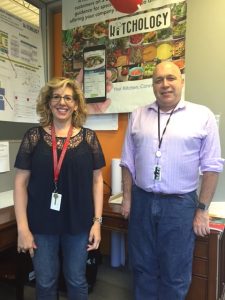A Look at Maryland Workforce Development News
A number of forces are at work within the state of Maryland that contribute to workforce development. Community and four-year colleges and trade schools play the main role in preparing students for careers, and grants received at the state and local level also help to drive the economy and stimulate employment. You may know on some level that all of this is happening, but you may not hear about it. This month, the Tech Council is highlighting some workforce development news.
Universities at Shady Grove
On October 20, USG broke ground on its Biomedical Sciences and Engineering Education Facility. Executive Director, Dr. Stewart Edelstein, said that the new building will allow USG to nearly double the number of students it serves from 4,000 to 7,500 when the building opens in 2019. This means that USG will provide more businesses in Montgomery County and in the region with a talent pool of qualified graduates in cutting-edge high-demand science, technology, engineering, math, and medical sciences positions. USG, along with the University of Maryland, Baltimore, University of Maryland, College Park, and UMBC will offer undergraduate and graduate degrees in healthcare, biosciences, engineering, and computational sciences.
According to the U.S. Chamber of Commerce Foundation, Maryland leads the country in academic research and development and has the third highest concentration of high tech businesses in the nation. However, the growth of skilled jobs in Montgomery County continues to outpace available candidates in the region. There is a projected demand for nearly 117,000 new workers by 2017 to fill new or vacated positions in Montgomery County, and an expected shortage of qualified workers to fill the region’s wide range of occupations.
Loyola University
Loyola University Maryland has been awarded an $80,977 grant from the National Science Foundation (NSF) for a collaborative project that will significantly enhance undergraduate physics education by developing, evaluating, and sharing methods to incorporate workforce-relevant skills and activities in the student experience. The project, “The PIPELINE Network: Supporting the Development of Physics Innovation and Entrepreneurship Education through Institutional Engagement,” integrates the efforts of Loyola and five other institutions that received grant funding from NSF including the University of Colorado Denver, Rochester Institute of Technology, Wright State University, The George Washington University, and the College of William and Mary. At the conclusion of the three-year project, PIPELINE Network schools will share materials nationally through the American Physical Society. Bahram Roughani, Ph.D., associate dean for natural and applied sciences and principal investigator on the grant commented that, “Incorporating workforce-relevant training into a technical discipline like physics boosts student retention and career readiness and attracts more students from groups that are historically underrepresented in STEM. More broadly, we now have the opportunity to work together to change the widely held perception that pursuing a physics degree limits a student’s career options.”
The University of Maryland/Morgan State Joint Center for Economic Development
The University of Maryland/Morgan State Joint Center for Economic Development (EDA Center) announced recently that a new grant secured from the U.S. Department of Commerce’s Economic Development Administration (EDA) will help fund a collaborative initiative that networks resources across the University System of Maryland (USM) to address economic challenges that face Maryland’s most vulnerable communities. Dr. Scott Dempwolf, Director of the EDA Center said that, “By amassing the talent, work, and ingenuity of Maryland’s research institutions with a common thread, we strengthen our efforts as individuals. Combined with the matching support of our partners, the EDA grant will help us continue our efforts through collaboration, research, teaching, and economic development practice.” Dr. Dempwolf will work with University System of Maryland’s new Vice Chancellor for Economic Development to develop a statewide network of economic developers working in and with USM’s 12 member institutions and two regional higher education centers. The network will connect economic research, resources, and best practices across all of the institutions, strengthening the capacity of USM and its member institutions to translate Maryland’s investments in research and education into local economic development impact statewide.
Anne Arundel County
Military service members in Maryland will have access to training for civilian jobs through a $4.3 million Labor Department grant awarded this month to the Anne Arundel Workforce Development Corporation.
The National Dislocated Worker Grant will go toward re-employment services for about 730 service members and spouses stationed mostly at Aberdeen Proving Ground, Fort Meade, Joint Base Andrews and Patuxent River Naval Air Station. The grants, funded through the Workforce Innovation and Opportunity Act of 2014, are designed to help states and local workforce investment boards re-employ laid-off workers quickly through occupational training.
State of Maryland
The state of Maryland announced a $2 million award from the United States Department of Labor’s ApprenticeshipUSA Expansion Grant. The grant will be used to invest in the State’s registered apprenticeship programming. Maryland Labor Secretary Kelly M. Schulz said that, “Apprenticeships allow Marylanders to work while they learn in some of the State’s leading industries. Investing in the future of the State’s workforce means investing in registered apprenticeships. A bedrock of Governor Larry Hogan’s strategic vision to make Maryland ‘open for business’ is to provide businesses with the skilled workforce they need to compete in the regional and global economies. Under the leadership of Governor Hogan, Maryland is working toward a sizable increase in apprenticeships, from 7,186 in 2012 to 9,258 today, with a goal of 9,500 by the end of 2016.” The new funds will be used to provide additional staffing and outreach to businesses interested in creating apprenticeship opportunities to meet their talent pipeline needs. The funds will also enable the Maryland Department of Labor to create a pilot program targeted at increasing apprenticeship opportunities for skilled immigrants in occupations within the healthcare industry.



